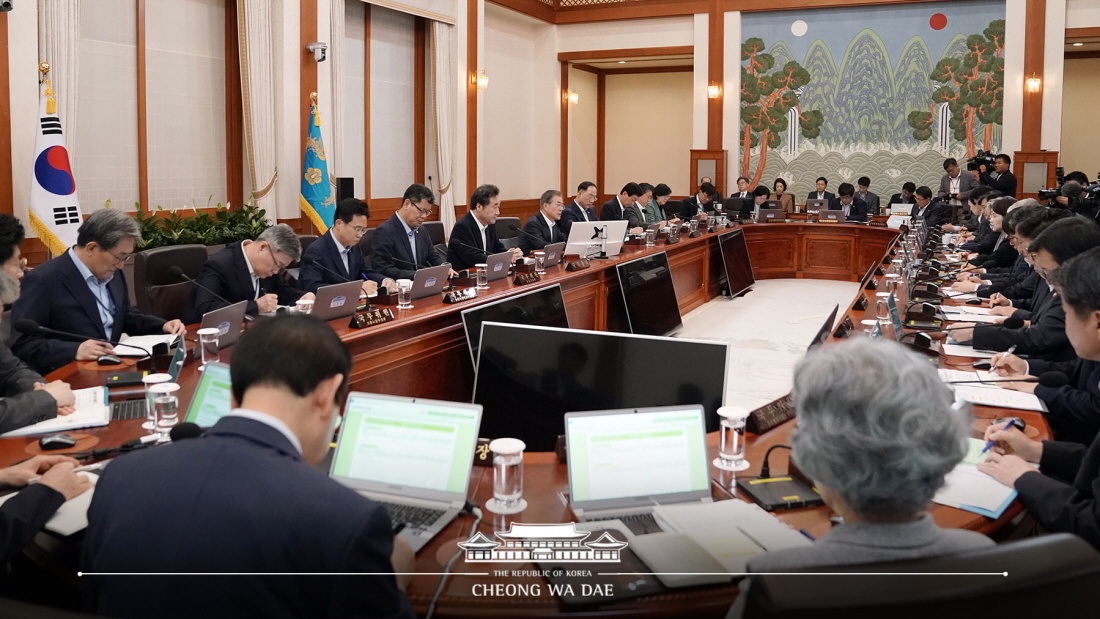이 웹사이트는 제19대 대통령 임기 종료에 따라 대통령기록관이 「대통령기록물 관리에 관한 법률」에 의해 이관받아 서비스하는 대통령기록물입니다. 자료의 열람만 가능하며 수정 · 추가 · 삭제는 불가능합니다.
다만, 「개인정보보호법」에 의하여 개인의 정보를 보호받기 원하시는 분은 관련 내용(요청자, 요청내용, 연락처, 글위치)을 대통령 웹기록물 담당자(044-211-2253)에게 요청해 주시면 신속히 검토하여 조치해 드리겠습니다. 감사합니다.
SPEECHES & REMARKS
BRIEFINGS

Escalating trade tensions around the world and a global economic downturn continue to put the Korean economy in a bind. Amidst this situation, the Government is doing everything possible to create new growth engines and enhance economic vitality with special focus placed on increasing economic dynamism.
The Government is concentrating its policy means on implementing a manufacturing renaissance strategy, fostering new industries and promoting a second venture boom. The pursuit of a fair-economy ecosystem and the creation of an atmosphere for mutual prosperity between large businesses and SMEs and for labor-management cooperation are ways to put in place environments and conditions for economic dynamism. Addressing the polarization and inequality with stronger inclusiveness and reinforcing the ground for social cohesion will serve as the foundation for a sustainable and dynamic economy.
What it takes to build a dynamic economy, more than anything else, is private sector vitality. To this end, the Government needs to exert more proactive efforts to listen attentively to what businesses have to say and find solutions for their difficulties.
With regard to shorter working hours, it seems that the related law has proven relatively successful among businesses with 300 or more employees. However, the business community is deeply concerned over the plan to expand the application of the law to firms employing 50 or more people next year. In order to help businesses prepare, the National Assembly must urgently pass the legislative bills concerning a flexible working hour system and others that can complement the measure. I urge Cabinet members to do all that you can for the sake of passing the relevant bills swiftly by holding government-ruling party consultations and persuading the National Assembly.
In addition, it’s also necessary to bear in mind situations where our legislative efforts have gone nowhere. I urge Cabinet members to also preemptively seek countermeasures that the Government can employ without parliamentary legislation on the basis of the government’s fact-finding survey.
We have to further accelerate regulatory reforms. It is lamentable that the passage of key legislative bills, such as the three bills concerning the data economy, is still pending. In particular, I urge Cabinet members to come up with measures that can produce practical outcomes by first modifying subordinate laws and ordinances, conducting active authoritative interpretations and revising guidelines even before the passage of laws.
Several days from now, it will be over 100 days since Japan’s export restrictions started. The Government and businesses’ swift and all-encompassing responses combined with public support have allowed the situation to be managed fairly well. There have also been meaningful achievements on various fronts, including the diversification of import sources, the attaining of self-sufficiency in technology and mutually beneficial cooperation between large businesses and SMEs. If we make this challenge a turning point and opportunity to basically transform Korea’s industrial structure, it will be of great help in strengthening the fundamentals and competitiveness of our economy. I ask Cabinet members to further speed up your endeavors. We must strengthen communication with the National Assembly so that it can quickly pass a special act to promote the material, component and equipment industries. We will also have to do everything possible to provide businesses with fiscal and financial supports and tax benefits.
In three days, a committee to promote material, component and equipment competitiveness headed by the Deputy Prime Minister and Minister of Economy and Finance will start to operate in earnest. I call on the committee – as a control tower gathering strength by connecting government policies and industrial fields – to do its utmost to drastically improve the competitiveness of key industries.



